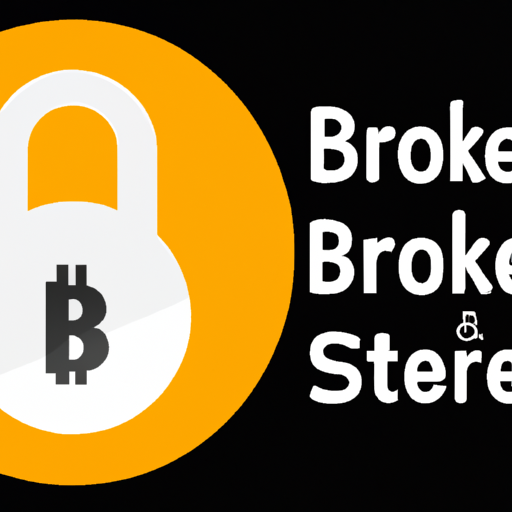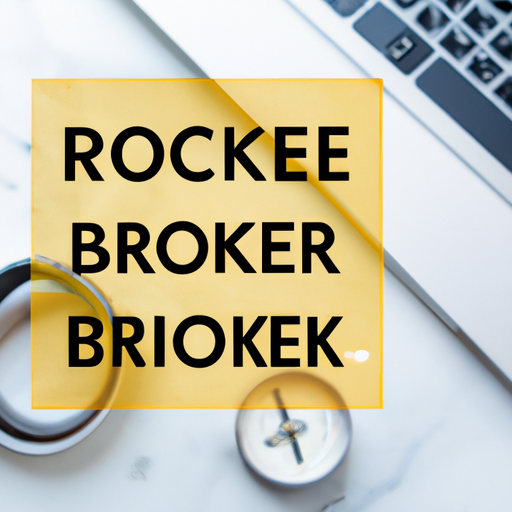
So, you’re looking to start investing in the stock market or trading cryptocurrencies? That’s great! But before you dive into the world of online trading, it’s important to choose a reputable brokerage platform. With so many options out there, it can be overwhelming to know where to start. Don’t worry though, because in this article, we’ll take a closer look at how to choose a brokerage platform that suits your needs and ensures the safety of your investments.
When it comes to choosing a reputable brokerage platform, there are a few key factors to consider. Firstly, you want to make sure that the platform is licensed and regulated by the appropriate authorities. This will give you some reassurance that the platform is operating legally and adhering to certain standards. Additionally, you should check whether the platform offers a user-friendly interface and a wide range of investment options. After all, you want to have access to a variety of assets to diversify your portfolio.
Furthermore, it’s crucial to consider the fees and commissions associated with the brokerage platform. Some platforms may charge high fees or have hidden costs that can eat into your profits. Take the time to research and compare different platforms to find one that offers competitive pricing without sacrificing quality service. Lastly, don’t forget to read reviews and testimonials from other users to get a sense of the platform’s reputation and customer satisfaction. In the end, choosing a reputable brokerage platform is all about doing your due diligence and finding one that aligns with your investment goals and preferences. So, let’s dive into the details and find the perfect platform for you.

Research Different Brokerage Platforms
When it comes to choosing a reputable brokerage platform, conducting thorough research is essential. With so many options available, it’s important to compare the features, reputation, security measures, and user reviews of different platforms. By following these steps, you can make an informed decision about which platform is right for you.
Compare the Features and Services
The first step in choosing a reputable brokerage platform is to compare the features and services offered. Consider what type of trading you plan to engage in and what features are important to you. Some platforms may offer advanced charting tools, real-time market data, and educational resources. Others may have a wide range of tradable assets or allow for algorithmic trading. It’s important to find a platform that meets your specific needs.
Analyze the Reputation and Track Record
Another important factor to consider when choosing a reputable brokerage platform is its reputation and track record. Look for platforms that have been in operation for a significant amount of time and have a positive reputation within the industry. You can also check for any past regulatory issues or legal actions that may have been taken against the platform. It’s important to choose a platform that has a solid reputation and a history of providing reliable services.
Evaluate the Security Measures
When it comes to choosing a reputable brokerage platform, security is of utmost importance. You want to ensure that your personal and financial information is protected. Look for platforms that have robust security measures in place, such as encryption technology, two-factor authentication, and segregated client funds. Additionally, make sure the platform is compliant with industry regulations and has proper licenses and certifications.
Look for User Reviews and Testimonials
One of the best ways to gauge the reputation and reliability of a brokerage platform is by reading user reviews and testimonials. Look for platforms that have positive reviews and feedback from other traders. Pay attention to any common themes or concerns that may arise in the reviews. Keep in mind that no platform is perfect, but it’s important to choose one that has a majority of positive reviews and satisfied users.
Consider the Fees and Charges
Another important aspect to consider when choosing a reputable brokerage platform is the fees and charges associated with trading. While it’s important to find a platform that offers competitive fees, it’s equally important to understand the commission structure and any additional charges or hidden fees that may apply. Look for platforms that are transparent about their fee structure and provide detailed information about the costs involved in trading.
Understand the Commission Structure
Different brokerage platforms may have different commission structures. Some platforms charge a fixed fee per trade, while others charge a percentage of the trade value. It’s important to understand how the commission is calculated and how it will impact your trading costs. Consider your trading volume and frequency to determine which commission structure is most cost-effective for your needs.
Review Additional Charges and Hidden Fees
In addition to the commission, brokerage platforms may charge additional fees for certain services or transactions. These fees can include account maintenance fees, wire transfer fees, inactivity fees, and more. It’s important to review the platform’s fee schedule and understand the costs associated with using their services. Be wary of platforms that have high or excessive fees that could eat into your potential profits.
Compare Fee Structures of Different Platforms
To ensure you are getting the best value for your money, it’s important to compare the fee structures of different brokerage platforms. Take the time to research and compare the fees charged by different platforms for the same services. Additionally, consider the quality of the services and features offered by each platform in relation to the fees charged. It’s important to strike a balance between affordability and the quality of services provided.
Evaluate the Platform’s User-Friendliness
When it comes to choosing a reputable brokerage platform, user-friendliness is a key factor to consider. The trading interface should be intuitive and easy to navigate, allowing you to execute trades quickly and efficiently. Additionally, the platform should provide a range of tools and resources to help you make informed trading decisions. Here are some factors to consider when evaluating the platform’s user-friendliness.
Test the Trading Interface and Tools
One of the first things you should do when evaluating a brokerage platform is to test its trading interface and tools. Look for platforms that have a clean and user-friendly interface that allows for easy navigation and execution of trades. Additionally, consider the availability of advanced order types, such as stop-loss orders and limit orders, as well as real-time market data and charts.
Assess the Availability of Educational Resources
A reputable brokerage platform should also provide a range of educational resources to help you improve your trading skills and knowledge. Look for platforms that offer educational materials such as articles, videos, webinars, and tutorials. These resources can help you stay up to date with market trends, learn new trading strategies, and make informed investment decisions.
Consider the Accessibility Across Devices
In today’s digital age, it’s important to consider the accessibility of a brokerage platform across different devices. Look for platforms that have mobile apps or responsive web design that allows for seamless trading on smartphones and tablets. This ensures that you can access your account and execute trades on the go, giving you more flexibility and convenience in your trading activities.

Check the Platform’s Customer Support
Customer support is another important factor to consider when choosing a reputable brokerage platform. Inevitably, you may encounter issues or have questions that need to be addressed. It’s important to choose a platform that provides reliable and responsive customer support. Here are some factors to consider when checking the platform’s customer support.
Determine the Responsiveness and Availability
When evaluating the platform’s customer support, consider how responsive and available they are. Look for platforms that offer multiple channels of communication such as phone, email, live chat, or online ticketing systems. Additionally, consider their response times and whether they offer support during your preferred trading hours. It’s important to choose a platform that can address your concerns in a timely manner.
Review the Support Channels and Languages
Another important factor to consider when checking the platform’s customer support is the availability of support channels and languages. Make sure that the platform offers support in your preferred language and that they have support staff available through various channels. This ensures that you can easily communicate with the platform and receive assistance when needed.
Assess the Quality of Support Provided
Lastly, it’s important to assess the quality of support provided by the platform. Look for platforms that have knowledgeable and courteous support staff who can address your concerns effectively. Consider whether they provide personalized support or if it is more generic and automated. The quality of customer support can greatly impact your trading experience, so it’s important to choose a platform that values customer satisfaction.
Verify the Regulatory Compliance
Regulatory compliance is an important aspect to consider when choosing a reputable brokerage platform. You want to ensure that the platform operates within the legal framework and is subject to oversight by regulatory authorities. Here are some steps you can take to verify the platform’s regulatory compliance.
Look for Licenses and Regulation
One of the first steps you should take is to look for licenses and regulation. Check if the brokerage platform is registered with regulatory authorities such as the Securities and Exchange Commission (SEC) in the United States or the Financial Conduct Authority (FCA) in the United Kingdom. These regulatory bodies set standards for brokerages and ensure that they adhere to strict guidelines to protect investors.
Check for Memberships in Industry Organizations
Another way to verify the platform’s regulatory compliance is to check for its membership in industry organizations. Look for platforms that are members of reputable organizations such as the Financial Industry Regulatory Authority (FINRA) or the National Futures Association (NFA). Membership in these organizations signifies that the platform operates in accordance with industry standards and best practices.
Investigate Past Regulatory Issues
Lastly, it’s important to investigate whether the platform has had any past regulatory issues. Conduct a search online to see if there have been any legal actions or regulatory sanctions against the platform. While one or two minor issues may not necessarily indicate a red flag, a pattern of serious regulatory issues should be a cause for concern.
Evaluate the Range of Tradable Assets
When choosing a reputable brokerage platform, it’s important to evaluate the range of tradable assets offered. Different platforms may offer different types of assets, such as stocks, currencies, commodities, options, ETFs, or mutual funds. Here are some factors to consider when evaluating the range of tradable assets.
Assess the Variety of Stocks, Currencies, and Commodities
The first step is to assess the variety of stocks, currencies, and commodities available for trading on the platform. Look for platforms that offer a wide range of assets within these categories. This allows you to diversify your portfolio and have access to a greater number of trading opportunities.
Consider the Availability of Options, ETFs, or Mutual Funds
In addition to stocks, currencies, and commodities, consider the availability of other types of assets such as options, ETFs, or mutual funds. These assets can provide additional opportunities for diversification and potentially higher returns. If you have a specific investment strategy that involves these types of assets, make sure the platform offers them.
Examine the Geographical Coverage
Lastly, examine the geographical coverage of the platform. Some platforms may have a global reach, allowing you to trade in multiple markets around the world. Others may have a more limited coverage, focusing on specific regions or countries. Consider your trading preferences and goals to determine which platform offers the geographical coverage that aligns with your needs.
Consider the Technology and Tools
When choosing a reputable brokerage platform, the technology and tools offered are important factors to consider. Here are some factors to consider when evaluating the technology and tools offered by the platform.
Evaluate Trading Platforms and Order Execution Speed
One of the first things to consider is the trading platform offered by the brokerage. Is it user-friendly and reliable? Does it provide real-time market data and charts? Additionally, consider the order execution speed. Look for platforms that have fast and efficient order execution to ensure that your trades are executed at the desired price.
Assess the Availability of Advanced Charting and Analysis Tools
Advanced charting and analysis tools can greatly enhance your trading experience. Look for platforms that offer a wide range of technical indicators, drawing tools, and customizability. These tools can help you identify trading opportunities, analyze market trends, and make more informed trading decisions.
Determine the Level of Automation and Algorithmic Trading Support
Automation and algorithmic trading support can be a valuable feature for active traders. Look for platforms that offer features such as automated order placement, backtesting capabilities, and the ability to create or implement trading algorithms. These features can help streamline your trading activities and potentially improve your trading results.
Analyze the Account Types and Minimum Deposit
When it comes to choosing a reputable brokerage platform, it’s important to analyze the account types and minimum deposit requirements. Here are some factors to consider when analyzing the account types and minimum deposit.
Understand the Different Account Options
Different brokerage platforms may offer different types of accounts to cater to various traders’ needs. These can include basic accounts, premium accounts, individual retirement accounts (IRAs), or corporate accounts. Consider your trading goals, investment strategy, and risk tolerance to determine which account type is most suitable for you.
Review the Minimum Deposit Requirements
Minimum deposit requirements can vary significantly among brokerage platforms. Some platforms may have low or no minimum deposit requirements, while others may require a substantial initial deposit. Consider your financial situation and trading capital to determine which platform aligns with your budget and trading goals.
Consider the Benefits and Features of Premium Accounts
If you are a more experienced or high-net-worth trader, you may want to consider the benefits and features of premium accounts offered by brokerage platforms. Premium accounts may offer perks such as lower trading fees, personalized support, access to exclusive research or educational resources, and more advanced trading tools. Consider whether these features are important to you and whether they justify the potential higher costs.
Seek Recommendations and Consult Experts
In addition to conducting your own research, seeking recommendations and consulting experts can provide valuable insights when choosing a reputable brokerage platform. Here are some steps you can take to seek recommendations and consult experts.
Ask for Referrals from Experienced Traders
One of the best sources of information and recommendations is from experienced traders. Reach out to friends, colleagues, or online communities who have experience in trading and ask for their recommendations. They can provide valuable insights into their experiences with different brokerage platforms and help you narrow down your options.
Consult Financial Advisors or Professionals
Financial advisors or professionals can also provide guidance and recommendations when choosing a reputable brokerage platform. They are knowledgeable about the industry and can assess your specific needs and goals to provide tailored advice. Consider consulting a financial advisor or professional who specializes in investments or trading for expert insights.
Utilize Online Communities and Forums
Lastly, utilize online communities and forums dedicated to trading and investments. These communities often have active discussions and threads where traders share their experiences and recommendations. Participate in these communities and ask for recommendations or insights from other traders. Keep in mind that the opinions expressed in these communities are subjective, so it’s important to conduct your own research to validate the information provided.
Conclusion
Choosing a reputable brokerage platform is a crucial step in your trading journey. By following the outlined steps and conducting thorough research, you can make an informed decision that aligns with your trading goals and preferences. Remember to compare the features, reputation, security measures, fees, user-friendliness, customer support, regulatory compliance, tradable assets, technology, account types, and seek recommendations to ensure you choose a platform that meets your needs.



